Zoom
Trash
Related: Plants, Fruits, Vegies
- Cancer
- Permaculture
- Warnings About Food
- Apocalípsis
- Education
- Enterprise

Top 5 Reasons Never To Use Splenda. The Brain-Destroying, Cancer-Causing Ingredient Hidden In Most Of Our Food. Source: www.thetruthaboutcancer.com | Original Post Date: February 21, 2016 – There’s a widespread and silent killer that’s hidden in most foods that is slowly destroying millions (maybe even billions) of people’s health.
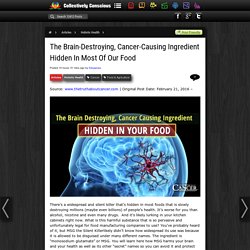
It’s worse for you than alcohol, nicotine and even many drugs. And it’s likely lurking in your kitchen cabinets right now. What is this harmful substance that is so pervasive and unfortunately legal for food manufacturing companies to use? Update: Gel Spice, Inc. Issues Expanded Recall of Ground Tumeric Powder Due to Elevated Lead Levels. Gel Spice, Inc. is expanding its recall of ground turmeric powder to include additional brands because of elevated lead levels.
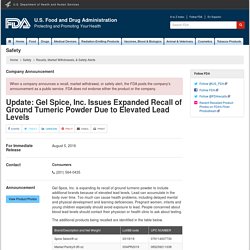
Lead can accumulate in the body over time. Too much can cause health problems, including delayed mental and physical development and learning deficiencies. Pregnant women, infants and young children especially should avoid exposure to lead. People concerned about blood lead levels should contact their physician or health clinic to ask about testing.
The additional products being recalled are identified in the table below. The products were distributed by various retailers throughout the United States. Sampling and testing of another product, produced from the same bulk turmeric, revealed the elevated level of lead. No illnesses have been reported to date in connection with this problem. Consumers who have purchased the ground turmeric powders identified above should discard the product. Why You Should Avoid Splenda. There are many of us who indulge in artificial sweeteners once in a while—a can of diet soda now and then, perhaps a “guiltless” binge of sugar-free pudding packs—even though we know they may not be so great for us.

But, hey, neither is sugar, so how bad can Splenda be? The scientific community has been in favor of or officially “inconclusive,” on sucralose, aka Splenda, for years, even amid the growing anti-artificial chatter. The American Heart Association even stated in 2011 that, with moderate use, artificial sweeteners could assist with weight loss and have a positive effect on the metabolism. Analysis Finds Hormone Disruptor Used in Cosmetics in Nearly 50 Different Foods. Washington, D.C. – A new EWG analysis has found propyl paraben, a preservative linked to hormone disruption and not allowed in food sold in the European Union, in nearly 50 U.S. snack foods, including Sara Lee cinnamon rolls, Weight Watchers cakes, Cafe Valley muffins, and La Banderita corn tortillas.

Analysts used EWG Food Scores: Rate Your Plate database, which houses rating information on 82,000 foods and 5,000 ingredients, to determine which foods contain propyl paraben. Click here to see the full list of foods that contain propyl paraben. The findings are significant because a review of the latest scientific research shows that propyl paraben acts as a weak synthetic estrogen and can alter hormone signaling. A recent study by Harvard School of Public Health suggested that exposure to the chemical might be associated with diminished fertility, while another study found that it led to decreased sperm counts in rats.
Propyl Paraben. Do You Consume This Hormone Disruptor? Over 50% Of the Population Likely Does... Credit: Sara Lee “Would you like fertility problems and premature balding with that cinnamon bun…” Such should be a question asked when selling certain toxic, pre-packaged foods in America, especially since a known endocrine disruptor lurks in over 50 popular snack foods many reach for without second thought.

But who actually second-guesses the safety of their food when approved by organizations like the FDA? And this is exactly the case with the endocrine-disrupting chemical, propyl paraben. Although the European Food Safety Authority banned the preservative (often used in make-up and cosmetic products) from being used in food products in 2006, the Food and Drug Administration has listed it to be “Generally Recognized as Safe” (GRAS). Credit: Pharmacopeia And this is a big problem, according to an analysis recently released by the Environmental Working Group (EWG). Credit: Weight Watchers. We are eating WHAT? - Advertisement - Dangerous Herbs May be in Your Food--Unlabeled What if you took a spoonful of your morning cereal and had an allergic reaction or even felt tranquillized?

But when you looked at the package labeling there were no ingredients that would seem to be red flags? Increasingly, thanks to an FDA loophole, food makers use additives and chemicals that they and not the FDA have declared "safe" and the ingredients do not appear on the labels. Sometimes the FDA does not even know they are added to the food products. Dunkin’ Donuts Gets Rid of Sunscreen Chemical in Powdered Topping. Making powdered sugar is, in essence, a simple process.
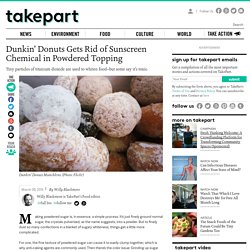
It’s just finely ground normal sugar, the crystals pulverized, as the name suggests, into a powder. But to finely dust so many confections in a blanket of sugary whiteness, things get a little more complicated. For one, the fine texture of powdered sugar can cause it to easily clump together, which is why anti-caking agents are commonly used. MSGTruth.org. MSGTruth.org. 5 Common Food Additives That Are Toxic to Your Brain. Deane Alban, ContributorWaking Times Eating mostly whole foods as nature intended is the best recipe for a brain-healthy diet.
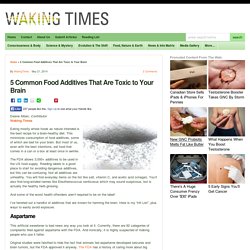
This minimizes consumption of food additives, some of which are bad for your brain. 2014/07/16/what-are-the-top-4-dangerous-toxins-to-the-brain/WlagXcIMLCtoR6Kv.99. New Study: Alzheimer's & Aluminum Link Can No Longer Be Ignored. By DR.
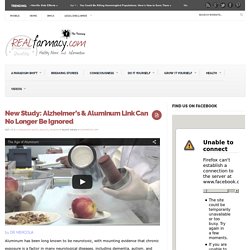
MERCOLA Aluminum has been long known to be neurotoxic, with mounting evidence that chronic exposure is a factor in many neurological diseases, including dementia, autism, and Parkinson’s disease. However, definitive scientific proof is difficult to establish due to the the lack of longitudinal studies, as well as pushback from industries that use aluminum in their products. Despite the shortage of conclusive studies, mounting scientific evidence leaves little room for doubt. Case in point: a new case study from Keele University in the UK unequivocally shows high levels of aluminum in the brain of an individual exposed to aluminum at work, who later died from Alzheimer’s disease.
While aluminum exposure has been implicated in Alzheimer’s and a number of other neurological diseases, this case claims to be “the first direct link” between Alzheimer’s disease and elevated brain aluminum following occupational exposure. The Aluminum-Alzheimer’s Link.